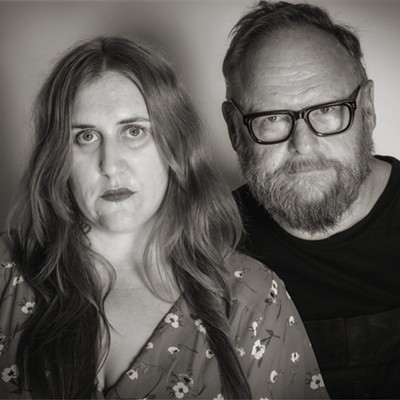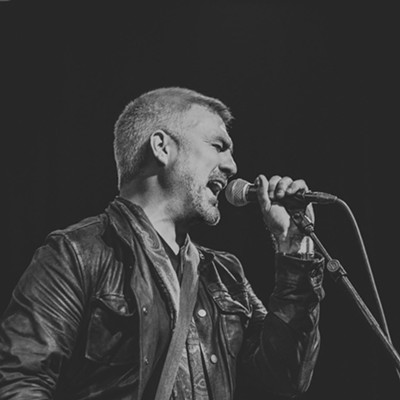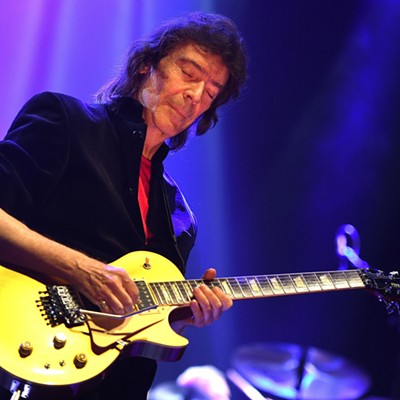While Mice Parade actually is a band these days, composed of eight members, it started out as a solo project that reflected Pierce's numerous musical interests and inspirations. As a drummer, Pierce was interested in electronic rhythms, and as a guitarist and songwriter, Pierce was also interested in home recording and song crafting. Mice Parade's real roots stretch back to 1994 or 1995, when, Pierce explained, he began working on what was to be a solo record.
"I'd always been in bands and stuff, and I'd do recording--I had a little 8-track and some recording gear and that kind of stuff, and after a few years of messing around ... I went to make an Adam Pierce record. I had these 40 songs, and some of the songs were kind of rocking and singy, or singy and more from my background of where I was coming from with the band.
"And then some of the songs--this was back in '94 or '95, before they were calling anything 'electronica,' when Aphex Twin's Selected Ambient Works 85-92 was awesome--... (were) influenced from that kind of music that was new at the time," said Pierce. "So I went and mastered this record, this Adam Pierce record, and thought to myself, 'Why did I do that? I have no justification for making a solo record; I'm young, I got a lot of life left in me.' ... I didn't feel like I deserved it. So I just shelved it for a long time, and then I kept recording some more of this stuff that was all these loopy, dancey drum beats and all this stuff that felt kind of weird to me in '95, and that became the first Mice Parade record."
By 1998, Pierce released that first Mice Parade record, The True Meaning of Boodleybaye. It showed Pierce's propensity for "loopy, dancey drum beats" that were more ambient jazz than electronica. The microbeats were mixed with vibraphone and upbeat melodies, making Mice Parade sound more like a low-fi Tortoise than Aphex Twin. After 1999's Ramda (released on Bubblecore, Pierce's own label), Pierce began mixing even more elements into his compositions; 2001's Mokoondi has hints of traditional African and Chinese music, and 2004's Obrigado Saudade brought a little of South America into the batter, finding Pierce focusing more on the nylon-string acoustic guitar. Bem-Vinda Vontade, Mice Parade's newest creation, is, like Obrigado Saudade, infused with jazz samba, but, maintains Pierce, it's not intentional.
"I would say it's safe to say you might play more nylon-string guitar if you listen to more nylon-string guitar. That would happen to anybody," said Pierce. "Our other guitarist argues that (the Brazilian sound) is definitely there. It's funny, because I don't think it's really there. I don't purport to say that there is a lot of that style of music being played in this music, but there are little pieces you could point out, for sure."
Throughout, Bem-Vinda Vontade is an amalgamation of pop, jazz, electronica and various other styles of the world, including those pieces of samba. The breathy vocals, maracas and guitar flourishes in "The Days Before Fiction" point toward Brazil, but the gamelan on "Ende" places it somewhere further east. "Ground as Cold as Common" is basically a rock song played on acoustic guitar, and the keyboards on "Waterslide" and "Passing and Galloping" sound like pianos in a cave. The lyrics, if there are lyrics, are hushed and layered. Despite the commune of instruments, each song on Bem-Vinda Vontade is, at its heart, a pop song, with verses and choruses and melodies, and a central harmonic element that keeps it all together. The songs are of a consistent and content mood, which is where Bem-Vinda Vontade differs from its predecessor, Obrigado Saudade, which maintained a cloudier mood.
The album titles reflect this connection and distinction. "Obrigado" means "thank you" in Portuguese, and "saudade," explained Pierce, translates roughly to "somewhere between nostalgia or lovesickness, homesickness--it's some sort of sickness without any subject matter attached, without the home or the love part." "Bem-vinda vontade," on the other hand, translates to "welcome will," as in opening the front door to willpower and inviting it in for coffee. While Obrigado Saudade embraces ennui, Bem-Vinda Vontade embraces something more optimistic and steadfast. Musically, this is expressed through the warm acoustic drums that are always shuffling away in the background. It's in the way the cave-like piano in "Passing and Galloping" shifts into distorted electric guitars, and in the elfin voice of Kristina Anna in "The Boat Room." It's in the vibraphones--the sound they emit is light, but the melody they play, like the drum rhythms, grounds the songs as the other instruments float in and out.
Mice Parade's current sound is due to the mostly acoustic instruments it uses, and the fact that the band is no longer just a solo project. "It's eight people now," said Pierce, "and when we get together, it really comes alive. It's not brought to life until everyone plays it, I think. There's a lot of input. I try to get as much input from everyone as possible."
Like an anagram, Pierce begins with some people, a variety of acoustic instruments, several different musical styles, and rearranges them to form something new.








